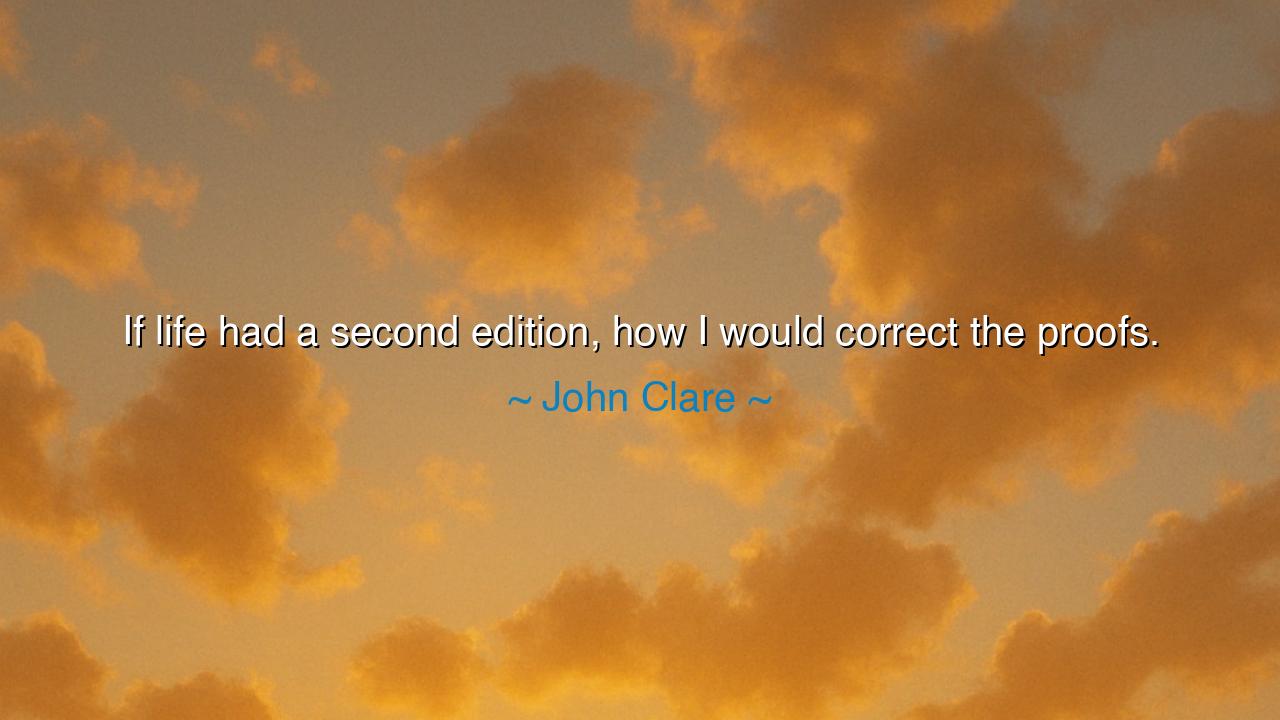
If life had a second edition, how I would correct the proofs.






"If life had a second edition, how I would correct the proofs." These poignant words, spoken by the poet John Clare, reflect a universal sentiment—the desire for redemption and reflection upon the mistakes and choices of a lifetime. Clare, in his yearning for a second chance, echoes a longing that has resonated throughout history. If we could revisit the chapters of our lives, what would we change? What decisions would we alter? What would we do differently if granted the power to revise the narrative of our existence? Clare’s reflection is both wistful and profound, as it speaks to the inevitability of regret, but also the desire for growth and correction.
In the great epic traditions of antiquity, we see a similar theme. The legendary figure of Achilles in Homer’s Iliad is a classic example of a hero driven by passion, pride, and wrath. Throughout his journey, he makes choices—decisions that lead to loss, regret, and the questioning of his own purpose. Achilles, like many heroes before him, could have benefited from the opportunity to revise his actions, to undo the harm he caused in his relentless pursuit of honor. It is in regret that many of the ancient heroes reflect upon their lives—looking back at the moments when their choices defined their fate. Clare, much like these ancient figures, expresses a yearning to go back and correct the mistakes that shaped his path.
Clare’s longing also reminds us of King Saul from the Bible. As the first king of Israel, Saul started with great promise and potential, but his reign became defined by disobedience and regret. The most poignant moment of Saul’s life comes when he seeks to correct his mistakes, but finds that the opportunity has passed. The moment for redemption slips away, leaving him to face the consequences of his actions. Just as Clare imagines a second edition of his life, Saul embodies the tragic reality of living with the knowledge that no second chance is coming—no revised proof can be printed. His life, marked by fate and choice, stands as a lesson to us all: the time to correct is always now, for once the pages are printed, they cannot be rewritten.
Consider also the example of Leonardo da Vinci, whose genius was tempered by the humility of reflection. Da Vinci, in his notebooks, often wrote about mistakes and the pursuit of perfection. He sought to correct his work constantly, revisiting projects and theories, making endless revisions to his inventions and art. Da Vinci’s desire for a second edition was not just a longing for another chance at his work—it was a reflection of the human condition itself. To look back and wish for a second chance is to acknowledge that even the greatest among us can fall short, but in that very recognition, we are given the opportunity to continue growing, evolving, and striving for excellence.
In a more modern sense, John Clare’s sentiment speaks to our own inner desire for growth and self-correction. How many times have we all wished for the opportunity to undo a moment, a decision, or an action? Whether in relationships, career choices, or personal growth, we are all familiar with the feeling of regret—the silent wish that we could erase a past mistake and start anew. But Clare’s longing for a second edition is not merely a wish for perfection; it is a call to reflect on the lessons we have learned and to continue striving to improve ourselves.
There is wisdom, however, in understanding that life does not offer such revisions. Life, in all its complexity and imperfection, is a manuscript that cannot be rewritten. Our mistakes, while painful, are part of the journey—a crucial part of what makes us human. The ancient philosophers understood that regret, when balanced with wisdom, leads to growth. Socrates famously said that an unexamined life is not worth living, implying that it is through reflection—not a desire to rewrite our past—that we come closer to truth and self-realization.
Thus, the lesson to be drawn from Clare’s poignant words is this: while we may never get a second edition of life, we do have the ability to revisit our actions through reflection, growth, and learning. Every day offers a new proof that we can correct and improve. Our mistakes are not the end, but part of a larger process that leads us to better versions of ourselves. Let us, therefore, approach each day with the intention of making those small corrections, knowing that while life may not allow a second edition, the wisdom we gain from each moment is the real revised proof that shapes our future.






AAdministratorAdministrator
Welcome, honored guests. Please leave a comment, we will respond soon